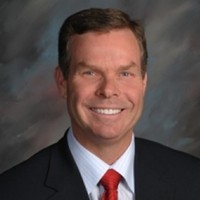Many of us enjoy vacation “bragging rights” and happily post photos of landmarks and the meals we ate on Facebook. There are three people, however, who likely wish the news of their 2009 California vacation would go away—for good. After City Weekly broke the story about a vacation taken by former Attorney General Mark Shurtleff, his then-chief fundraiser John Swallow and “corporate fix-it man” Tim Lawson at a luxury Newport Beach resort, the story was picked up by numerous local news outlets and sparked renewed calls for investigations and impeachment of Utah’s current attorney general, John Swallow.
In a series of interviews at Summit County Jail and Utah State Prison in Draper, convicted white-collar criminal Marc Jenson told City Weekly that he had hired Tim Lawson—Mark Shurtleff’s friend and confidant, who earned big bucks by offering troubled business owners access to Shurtleff—to get in Shurtleff’s good graces. A hard-money lender from Holladay with a criminal record, Jenson would need the stamp of approval from people in high places so he could develop an exclusive ski resort at Elk Meadows near Beaver.
Utah County political “fixer” Tim Lawson claimed to have arranged the California vacation. Lawson says he saw nothing wrong in taking Shurtleff and Swallow to the Pelican Hill resort, especially since he “paid” for the trip (although Jenson appears to have actually footed the bill as a perk he gave Lawson for his consulting services). Lawson says Jenson’s case had been adjudicated, with Jenson accepting a plea deal wherein he agreed to pay his victims $4.1 million by 2010 or else face serious jail time.
While they were guests at the villa in California, Jenson says, he met personally with Shurtleff, and Shurtleff offered Jenson future “protection.” Not only did Jenson believe that Shurtleff had his back, but another in Jenson’s circle, Park City businessman Mark Robbins—a frequent guest at Pelican Hill resort—also appears to have benefited from the services of Lawson and the good will of the state’s attorney general.
An Investor Scorned
Mark Robbins has operated numerous companies and partnerships where he’s become known for structured investments and stock lending. Until recently, he’s had his fingers in many pies. He worked with Jenson and other investors in the complicated and ultimately unsuccessful bid to buy the Mongoose bicycle company that resulted in Jenson’s securities-fraud charges.
He, along with his company Peninsula Advisors, helped broker the $100 million sale of Canyons Resort to Talisker in 2007. He also was a principal of Whitewater VII Holdings, which was planning a transit-oriented development in Draper.
In late 2008, facing a debt collection lawsuit totaling over $2 million dollars, Robbins vanished from the scene; former UTA board member Terry Diehl, who would later claim bankruptcy, then took over Whitewater VII.
Among those allegedly stung by Robbins was Darl McBride, the former CEO of Utah software company SCO, who claimed that Robbins borrowed several hundred thousand dollars from him while offering to arrange for long-term financing for McBride’s software company. Robbins vanished before settling up with McBride, McBride says.
McBride wanted to see Robbins brought before a judge and was using both the media and the Web to launch a campaign against Robbins.
In late spring 2009, Tim Lawson (mentioned in several City Weekly stories, including a Feb. 2, 2011, cover story titled “The Fix-It Man”) contacted McBride and told him to lay off Robbins, McBride says. Following that, McBride says, Shurtleff met with him and tried to end McBride’s online crusade against Robbins by offering to see if Marc Jenson could raise money to pay McBride back.
City Weekly has now learned that the meeting between Shurtleff and McBride is part of an active federal investigation.
White Water Rapids
Before Shurtleff arrived at Pelican Hill resort in 2009, Jenson says, Shurtleff was impressed with Jenson’s wealthy network of friends and asked Jenson to introduce him to them. At the time, Shurtleff was gearing up for his campaign race against Utah’s U.S. Sen. Bob Bennett and needed campaign donations. According to Jenson, Shurtleff and Swallow met with Jenson’s friends, including Mark Robbins, during their visit at Pelican Hill resort in California.
In 2008 and early 2009, Robbins planned to develop property around a Draper FrontRunner transit station with his Whitewater Holdings VII company. But before he could put those plans in motion, on Nov. 26, 2008, 3rd District Court Judge Sandra Peuler issued a civil judgment naming Robbins as a debtor in a case where his company had accepted shares in an Australian mining company as collateral in a stock-loan agreement.
Court documents say that Robbins’ company broke the loan agreement and sold the company shares without prior approval. The November 2008 judgment ordered Robbins to pay $2.3 million to his creditors. The judgment also identified dozens of companies Robbins had a hand in that were liable for paying the judgment, including Whitewater VII.
According to news accounts, UTA board member Terry Diehl began working for Whitewater VII in September 2008 and became the owner by December 2008. A year later, after UTA officially selected the 12800 South site as a FrontRunner station, Diehl sold the development rights for an undisclosed sum.
In response to a March 2009 KSL story about why Robbins chose to extricate himself from the Whitewater VII project, Robbins simply stated, “My personal financial situation has been impacted by the global financial crisis to a degree that I could not continue with the development.”
Richer Than God
Around the same time, software company CEO Darl McBride also claimed to have been victimized by Robbins. He would file a debt-collection lawsuit against Robbins in March 2009 for a deal that went down in late 2008.
At the time, McBride’s company, SCO, had been involved in a protracted lawsuit with IBM and was looking for a loan to keep the company afloat until the lawsuit was settled. McBride says that Robbins flew around in a corporate jet and liked to “pass himself off as being richer than God.”
McBride says that Robbins’ company agreed to commit to long-term capital financing. McBride says that before the financing was in place, Robbins asked McBride for several hundred thousand dollars in what was to be a short-term loan.
Robbins declined to be interviewed for this story but replied to questions through his attorney, James Nesland. Robbins says he owes nothing to McBride. “I categorically deny that I or any of my companies owes Darl McBride anything. There is no documentation that I owe him $300,000 in short-term loans or that my company committed to finance $5 million or any other amount for him,because those transactions and commitments never happened.”
McBride says that after he loaned money to Robbins, he found out that Robbins, a Park City resident, had left the state and was wanted on a warrant to appear in court on the civil debt-collection judgment issued in the case with the Australian mining company. The bench warrant was later vacated, and Robbins’ company, American Institutional Partners, filed a Chapter 11 bankruptcy in 2009.
McBride complained to the Attorney General’s Office about Robbins but says he got the “cold shoulder,” so he decided to take his debt-collection battle online. He created the persona of the “SkyLine Cowboy” and a website listing information about Robbins and offering rewards for information about Robbins’ whereabouts so that he could serve Robbins with court papers.
“It was literally like bounty hunting in the Old West,” McBride says.
McBride’s unorthodox tactics quickly gained the attention of Tim Lawson who, McBride says, told him to take down his website—or else.
“Tim Lawson calls me up and he’s just going ballistic, threatening me and saying he was going to use his firearm against me and that he had Polynesian friends that were going to bust me up,” McBride says. “It was just one threat after another.”
Though Lawson disputes that he threatened to send other people to “bust up” McBride, he says he did threaten McBride because McBride’s bounty hunting could have harmed Robbins’ wife and kids. “You don’t go after somebody’s family like that,” Lawson says, adding that “people like that should be taken out and shot.”
McBride says that Lawson was able to arrange a breakfast meeting with Shurtleff in early May 2009, at Mimi’s Café in Murray. At the meeting, McBride says, Shurtleff urged him to lay off Robbins and said he’d have a better chance of getting his money back if he did. Further, McBride says, Shurtleff said he was going to see Marc Jenson in the next few days and suggested he might be able to see if Jenson would help raise $2 million to pay off McBride’s losses and provide some of the capital Robbins allegedly had committed to raise for McBride.
McBride did not immediately back down from his digital bounty hunting but says he didn’t hear from Shurtleff or Lawson again after the breakfast meeting. In June 2009, he received a civil judgment on a $109,627 deal done in Robbins’ wife’s name. Thanks to his website, McBride says, he got a tip that Robbins was at Pelican Hill and was able to serve papers on Robbins’ wife there and later collect on that debt.
Click below to read selections from a transcript of a July 2, 2009, creditors meeting, during which McBride was interviewed about Robbins. Or download the full transcripts: Part 1 (relevant pages 1-54 and 100-109) and Part 2 (relevant pages 55-99).
McBride was shocked enough by his meeting with Shurtleff that he says he told the FBI about it.
Through his attorney, Robbins stated that “I have never in my entire life asked any Utah official to intercede on my behalf for anything, including Mark Shurtleff, John Swallow or any government official.”
He likewise denies paying Lawson for his alleged involvement. Lawson says he called McBride not because Robbins’ was paying him but because sticking up for Robbins’ family was simply the right thing to do.
Robbins stresses that his disputes with creditors were civil matters. “I’ve never been involved with any criminal proceedings in my life,” Robbins writes.
Shurtleff, now a private attorney at the Washington, D.C., firm Troutman Sanders, declined to comment for this story.
Good Cop/Bad Cop
The attorney general is often referred to as the state’s top cop. And for McBride, Shurtleff was simply playing “good cop” in trying to get him to back off Robbins, especially after Lawson’s bad-cop routine included threats of violence.
Shurtleff’s “whole objective of this two-hour breakfast meeting was to essentially say: ‘Back off Robbins—this [digital bounty hunting] is really hurting his business prospects,’ ” McBride says. “I just remember sitting there looking at him like, ‘Mark, you are the top lawman, he has stolen my money and millions from other people, and you are sitting here protecting him?’ ”

